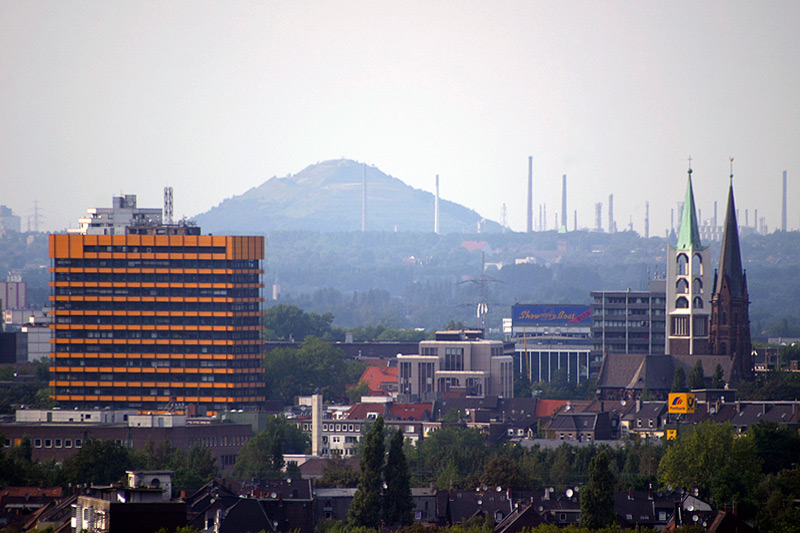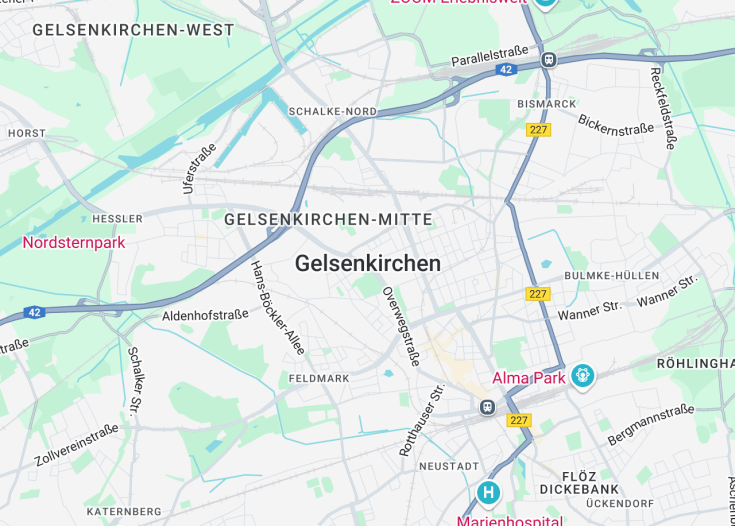Gelsenkirchen, a city steeped in industrial history, is located in the heart of the Ruhr Area in Germany. Known historically for its coal mines and steel mills, it has successfully transformed into a modern city with lush green spaces and contemporary cultural attractions. Highlights include the ZOOM Erlebniswelt, an innovative zoo, and the Nordsternpark, a prime example of industrial heritage turned into an urban oasis. Gelsenkirchen also boasts a rich musical and theatrical scene, making it an attractive destination for both history enthusiasts and culture seekers.
When visiting Gelsenkirchen, be sure to explore the Schloss Horst, a Renaissance castle that beautifully encapsulates the region’s history and architectural evolution.
To fully experience the city, visit during one of its vibrant festivals, which celebrate everything from jazz music to local cuisine and heritage.
Top things to do & see in Gelsenkirchen
Select the following sights and activities to discover best tickets and tours available in Gelsenkirchen.
Gelsenkirchen: Gateway to the Ruhr Industrial Region
| Country | Germany |
| Time in Gelsenkirchen | GMT+1 |
| Language spoken | German |
| Population | 259,645 (Statistical Office of Gelsenkirchen, 2021) |
| Currency | Euro (€, EUR) |
| Airports | [If multiple airports are relevant, format as an unordered list:
] |
Located in western Germany in the Ruhr area, Gelsenkirchen is a city recognized for its rich industrial heritage. Once a small agricultural village, Gelsenkirchen experienced exponential growth during the industrial revolution with the exploitation of coal deposits, which fueled various industries. Today, this city has transitioned from its heavy industrial past to focus more on information technology and service industries. Despite its modern changes, Gelsenkirchen retains historical landmarks such as the Zeche Zollverein, a former coal mine turned museum, making it an important cultural site. The city also features green spaces and parks where residents and visitors can relax and enjoy nature.
Where is Gelsenkirchen?
Located in the heart of the Ruhr region in North Rhine-Westphalia, Germany, Gelsenkirchen is strategically positioned between some of Germany’s largest cities.
Distances:
| Route | Distance by car | Time by car |
|---|---|---|
| Gelsenkirchen to Dortmund | 22 mi (35 km) | About 30 minutes |
| Gelsenkirchen to Düsseldorf | 34 mi (55 km) | About 50 minutes |
| Gelsenkirchen to Cologne | 56 mi (90 km) | About 1 hour |
What is Gelsenkirchenfamous for?
Gelsenkirchen is famous for its historical ties to the coal mining industry, which has significantly shaped the city’s development and cultural heritage.
History
Pre-20th Century
The area now known as Gelsenkirchen was first inhabited by Germanic tribes, settled prominently after the fall of the Roman Empire. These gradually developed into small agricultural and trading communities. The actual name Gelsenkirchen was first documented in 1150 but became more commonly referenced in the late Middle Ages when coal was discovered in the region. This discovery didn’t instantly transform the area, but it set the stage for Gelsenkirchen’s later prominence in coal mining.
Industrial Expansion (1850-1950)
Gelsenkirchen’s transformation into a major industrial city began in the mid-19th century with the booming coal mining industry. The opening of the Gelsenkirchen Mining School in 1900, which later became a part of the Westphalian Mining Office, marked a pivotal development, enhancing the city’s role in the coal mining sector. World War II significantly affected Gelsenkirchen, with heavy bombings damaging much of the city due to its status as an industrial hub.
Post-World War II and Modern Era (1950-Present)
The post-war era was a time of rebuilding for Gelsenkirchen. The decline of coal mining in the 1960s and 1970s forced the city to diversify its economic base, leaning towards service industries and environmental technologies. Presently, Gelsenkirchen is recognized for its initiatives in solar energy and hosts numerous cultural and educational institutions, reflecting a transformation from its heavy industrial roots to a focus on sustainability and quality of life.
Visit Gelsenkirchen
What to see and do in Gelsenkirchen
Gelsenkirchen offers a blend of cultural, historical, and recreational activities:
- Zoom Erlebniswelt: An expansive zoo that offers an immersive experience into different world ecosystems.
- Veltins Arena: Home to the Schalke 04 football club, it’s a must-visit for sports enthusiasts.
- Nordsternpark: A beautiful park that was once a coal mine, now transformed into a public space with art installations and a climbing wall.
- Buer’s Old Town: Explore this charming district filled with shops, cafes, and periodic markets.
Festivals and Events in Gelsenkirchen
Gelsenkirchen is vibrant with cultural festivals and events throughout the year. Notably, the ‘Jazz in the City’ festival occurs each September, drawing jazz lovers from all around. The Christmas market in December is a festive period when the city comes alive with lights and decor.
Best time to visit Gelsenkirchen
The ideal time to visit Gelsenkirchen is during late spring through early autumn, from May to September, when the weather is most pleasant, and most of the city’s events and festivals take place.
Is Gelsenkirchen worth visiting?
Gelsenkirchen is indeed worth visiting, especially for those interested in exploring a city that has excellently transitioned from an industrial past to a future focused on culture and sustainability. The city offers a rich palette of activities, from sports and culture to relaxation in its green spaces. Moreover, with its wide array of festivals and community events, there is often something exciting happening.









